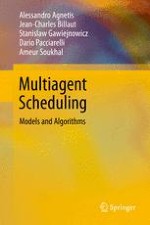2014 | OriginalPaper | Chapter
4. Batching Scheduling Problems
Authors : Alessandro Agnetis, Jean-Charles Billaut, Stanisław Gawiejnowicz, Dario Pacciarelli, Ameur Soukhal
Published in: Multiagent Scheduling
Publisher: Springer Berlin Heidelberg
Activate our intelligent search to find suitable subject content or patents.
Select sections of text to find matching patents with Artificial Intelligence. powered by
Select sections of text to find additional relevant content using AI-assisted search. powered by
